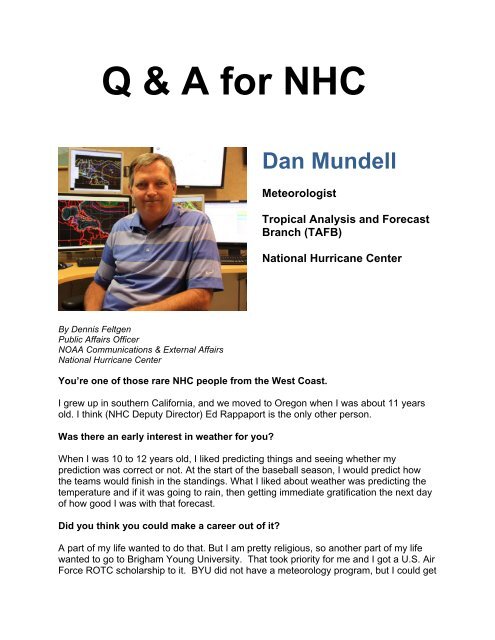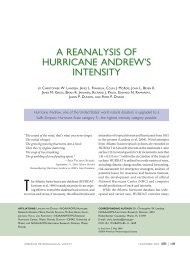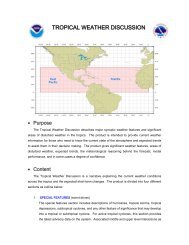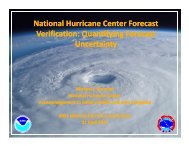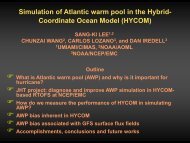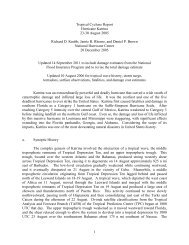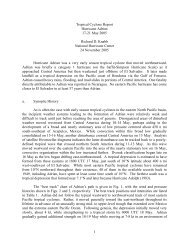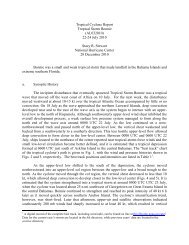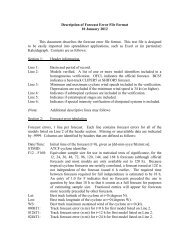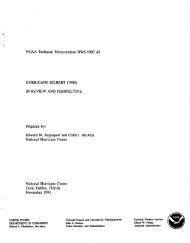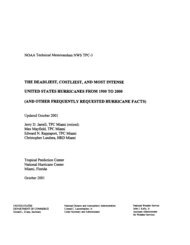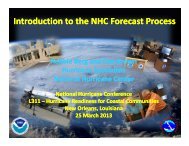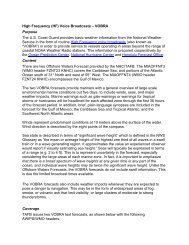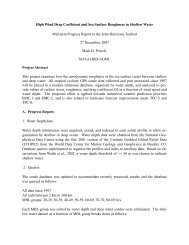Q & A for NHC Dan Mundell - National Hurricane Center - NOAA
Q & A for NHC Dan Mundell - National Hurricane Center - NOAA
Q & A for NHC Dan Mundell - National Hurricane Center - NOAA
Create successful ePaper yourself
Turn your PDF publications into a flip-book with our unique Google optimized e-Paper software.
Q & A <strong>for</strong> <strong>NHC</strong><br />
<strong>Dan</strong> <strong>Mundell</strong><br />
Meteorologist<br />
Tropical Analysis and Forecast<br />
Branch (TAFB)<br />
<strong>National</strong> <strong>Hurricane</strong> <strong>Center</strong><br />
By Dennis Feltgen<br />
Public Affairs Officer<br />
<strong>NOAA</strong> Communications & External Affairs<br />
<strong>National</strong> <strong>Hurricane</strong> <strong>Center</strong><br />
You’re one of those rare <strong>NHC</strong> people from the West Coast.<br />
I grew up in southern Cali<strong>for</strong>nia, and we moved to Oregon when I was about 11 years<br />
old. I think (<strong>NHC</strong> Deputy Director) Ed Rappaport is the only other person.<br />
Was there an early interest in weather <strong>for</strong> you?<br />
When I was 10 to 12 years old, I liked predicting things and seeing whether my<br />
prediction was correct or not. At the start of the baseball season, I would predict how<br />
the teams would finish in the standings. What I liked about weather was predicting the<br />
temperature and if it was going to rain, then getting immediate gratification the next day<br />
of how good I was with that <strong>for</strong>ecast.<br />
Did you think you could make a career out of it?<br />
A part of my life wanted to do that. But I am pretty religious, so another part of my life<br />
wanted to go to Brigham Young University. That took priority <strong>for</strong> me and I got a U.S. Air<br />
Force ROTC scholarship to it. BYU did not have a meteorology program, but I could get
a Bachelor degree in math and science. Then, the USAF would send me somewhere to<br />
get the meteorology courses I would need to be a weather officer. And that’s what I did.<br />
After I graduated BYU, I went up the road to the University of Utah, taking the basic<br />
meteorology courses in dynamical, physical and synoptic meteorology along with<br />
climatology. I ended up with a Bachelor degree in meteorology in addition to the math<br />
and science degree I got the year be<strong>for</strong>e.<br />
What did the USAF do with you?<br />
They sent me to Robins Air Force Base in Georgia as a weather officer. I would brief the<br />
weather crews every morning remotely, and I did the same thing <strong>for</strong> McGee Tyson AFB<br />
in Tennessee. I always wanted to be pilot, but that was not going to happen as I had<br />
color-blindness. I did find that I could be on a flight crew as a weather officer on the<br />
weather reconnaissance squadron flying out of Anderson AFB on Guam. I went to<br />
Guam, but there were no weather officer slots available. Instead, I was offered the job of<br />
managing the satellite operations at the Joint Typhoon Warning <strong>Center</strong> (JTWC) there. I<br />
took it, and hoped to transition into the reconnaissance squadron. But funding was cut<br />
in 1984 and the squadron was closed.<br />
So you stayed with the JTWC?<br />
Yes, I ran the satellite operations, working very closely with the Navy. I really enjoyed<br />
what I did, learning the Dvorak satellite technique and getting very skilled in what I do.<br />
That would have triggered an interest in typhoon <strong>for</strong>ecasting.<br />
It did. When my two years of duty was up in Guam, I applied to get a Master’s degree in<br />
tropical meteorology at Colorado State University under Dr. Bill Gray. I got the degree<br />
and came back to the JTWC <strong>for</strong> five years, serving as a typhoon duty officer and putting<br />
out typhoon <strong>for</strong>ecasts <strong>for</strong> the Eastern Hemisphere. I owe the USAF a great debt of<br />
gratitude <strong>for</strong> educating me with skills <strong>for</strong> that job. But, it probably hurt my career path<br />
spending all that time on Guam.<br />
How is that possible?<br />
I was focused on one area, and the Air Force wants you to diversify. When it came time<br />
<strong>for</strong> me to be promoted from Captain to Major, I was passed over. And if you’re not<br />
promoted to Major, you get separated. I left Guam and went to Europe <strong>for</strong> year hoping,<br />
<strong>for</strong> a second time, to be promoted. It didn’t happen, so I had to leave the military.<br />
Another door usually opens when one is closed.<br />
The <strong>National</strong> Weather Service on Guam was in need of <strong>for</strong>ecasters. It was a fairly new<br />
office, and they reached out to me to apply, as I had all that experience there. I began<br />
working <strong>for</strong> the Weather Service the day after I left the Air Force and stayed there <strong>for</strong><br />
nearly 8 years as a lead <strong>for</strong>ecaster. Then the opportunity came up to take a downgrade<br />
to a journey <strong>for</strong>ecaster on the U.S. mainland in Med<strong>for</strong>d, Oregon, which is very close to<br />
where I grew up.<br />
Guam was nice, but?
You’re outside the mainstream of weather offices, and I wanted to go back and work in<br />
an actual weather <strong>for</strong>ecast office. And I really enjoyed Med<strong>for</strong>d, it was great being<br />
home. The office did snow, fire weather, and a lot of marine <strong>for</strong>ecasting. Then, after a<br />
few years, I saw an opportunity to come the <strong>NHC</strong>’s Tropical Analysis and Forecast<br />
Branch (TAFB).<br />
Had you thought of that be<strong>for</strong>e?<br />
It was a lifetime ambition to be a hurricane <strong>for</strong>ecaster. I could apply all of the skills I<br />
learned in Guam and work at <strong>NHC</strong>. I was told that TAFB was a great step to move into<br />
the hurricane specialist slot at some point. So, I made the move here in 2006. I took a<br />
brief break in 2007 when all of the administration problems were occurring and went<br />
back to Guam <strong>for</strong> a couple of years. But the military changed the rules <strong>for</strong> federal<br />
employees living on base, so my wife and I came back to South Florida and I returned<br />
to TAFB. I decided to not pursue becoming a hurricane specialist, choosing instead to<br />
stay as a marine <strong>for</strong>ecaster in TAFB.<br />
What is your greatest challenge in TAFB?<br />
It’s making the transition to gridded <strong>for</strong>ecasts. The entire <strong>National</strong> Weather Service is<br />
using grids and speaking that kind of language. As a national center, we are on the<br />
leading edge of applying and using grids. I have the background in it from Guam and<br />
Med<strong>for</strong>d. It is a challenge using a new way to do things, using the grids to develop a<br />
<strong>for</strong>ecast <strong>for</strong> winds and seas instead of just using the models.<br />
I hear you are learning a second language.<br />
I have an assignment through my church to speak at different groups of people. Many<br />
of them are Hispanic and/or bilingual. So, I am trying to learn Spanish to better<br />
communicate with them.<br />
How do you relax?<br />
I’d like to play golf, but it is so expensive here. My father-in-law is a snowbird and lives<br />
in Brooksville, (Fla.); the rates are a lot better there. I am a big baseball fan, but the<br />
Marlins have me disenchanted right now. I am exercising more, which is a great way to<br />
clear the mind.<br />
Where do you see yourself in five to 10 years?<br />
I see myself remaining in TAFB with the goal to be one of its lead <strong>for</strong>ecasters, and then<br />
retiring from it. Med<strong>for</strong>d would be the only place I would want to move to if the chance<br />
came up. I still have a home there and plan to retire there.<br />
Send comments to: nhc.public.affairs@noaa.gov


